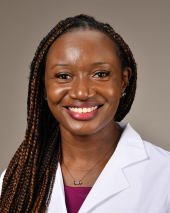Eclampsia: What pregnant women need to know

[ad_1]
An autopsy report revealed 32-year-old Olympic medalist Tori Bowie died from complications from eclampsia, or seizures attributed to preeclampsia, which is a pregnancy condition characterized by dangerously elevated blood pressure. Bowie was eight months pregnant. Although preeclampsia/eclampsia can happen to anyone who’s pregnant, there are ways to understand and mitigate risk for a healthy, happy pregnancy.

“It is a very unfortunate situation,” said Angela P. H. Burgess, MD, a maternal-fetal medicine specialist with UT Physicians. “Tori is a great example of how it can happen to anyone during pregnancy, since she was at the peak of health as an Olympic athlete, although severely underweight at time of delivery.”
Burgess, assistant professor in the Department of Obstetrics, Gynecology and Reproductive Sciences at McGovern Medical School at UTHealth Houston, said it appears Bowie had a seizure and most likely pulmonary edema, which led to respiratory distress. Bowie also had a history of bipolar disorder, which Burgess says is important to mention, as it also played a role in her pregnancy outcome.
“A lot of women don’t feel comfortable taking their medication during pregnancy, so they end up stopping,” Burgess said. “There are many medications that are safe to continue during pregnancy, and it’s more beneficial for the mom, as well as the baby, to continue it based on the very, very small medication risk. So, it’s important to discuss with a provider before self-discontinuing any medications.”
Risk factors
About 10% of women in the United States will experience preeclampsia during pregnancy, according to Burgess. In 2021, preeclampsia was responsible for 1,250 maternal deaths per 100,000 births in the United States. Burgess describes four factors that can contribute to pregnant women having a higher risk for developing preeclampsia:
- Chronic hypertension
- Diabetes
- African American ethnicity
- Preeclampsia in a prior pregnancy
Researchers are exploring why African American women are at a higher risk for preeclampsia. One area, Burgess said, is the level of stress and how much it contributes to and predisposes pregnant Black women to getting preeclampsia/eclampsia.
“There can be factors related to life stresses, systemic racism, and different stressors within the system that can combine to an already difficult situation,” Burgess said.
Prenatal care definitely plays a factor in a healthy pregnancy, according to Burgess, since providers can recognize potential issues for early intervention. She said it doesn’t mean Black women do not get prenatal care and that’s what leads to disease.
“That’s not the case,” Burgess said. “But we do know prenatal care, in general, helps to reduce these factors that lead to preeclampsia.”
Controlling what you can
It can be overwhelming to think about dangers related to pregnancy, especially at a time usually devoted to joyful planning. Burgess recommends to control what you can. In terms of prevention, a daily low-dose aspirin usually helps when patients have risk factors for preeclampsia.
Her primary recommendation, however, is to record blood pressure daily during pregnancy. This is regardless of any risk factors in place. This daily routine provides a baseline number, so if it gets elevated, it’s a sign to go to the hospital.
“A number like 140/90 is a warning sign that it could be getting a little high. At 160/110, that’s an indication of an emergency,” Burgess said. “It could cost you your life or your baby’s life, so go to the hospital to get it checked.”
Headaches in pregnancy can be worrisome, although many women brush them off, since it seems like a common pain. If a headache is not getting better after treating it with Tylenol, Burgess said it can signal preeclampsia. “This commonly happens after a woman delivers a baby, and there is a pretty high risk for preeclampsia after delivery,” Burgess said. “If blood pressure is high and there is a headache, absolutely run to the hospital. That requires medical treatment.”
Making a difference
Burgess has a passion for eliminating health disparities in health care. Since November 2021, she has been working on a project with Morgan Foreman, PhD candidate at McWilliams School of Biomedical Informatics at UTHealth Houston, exploring how to help African American women recognize certain symptoms and bridge gaps to work collaboratively and communicate with their doctors providing care. The goal is to use digital health theories to build out culturally tailored solutions for these women with an app or other technology solution to make collaboration and education simpler.
In addition to research, Burgess said there are things everyone can do to make a difference, so no one experiences pregnancy alone.
“If there is someone around you who is pregnant, think about different ways to support them,” Burgess said. “Support is needed — community support, partner support if a partner is present, taking care of the baby, helping them out if they’re stressed. Pregnancy is definitely something that shouldn’t be done all alone. It takes a village.”
[ad_2]
Source link
